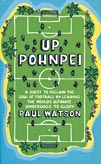 A quest to reclaim the soul of football by leading the world's ultimate underdogs to glory
A quest to reclaim the soul of football by leading the world's ultimate underdogs to glory
by Paul Watson
Profile Books, £12.99
Reviewed by Nick Dorrington
From WSC 303 May 2012
"Pohnpei," read the Wikipedia article, "have never registered a win." That sentence alone was enough to pique the interest of frustrated football writer Paul Watson, who was sick of regurgitating news and writing profiles of players he had barely heard of. Searching for a national team bad enough to give them a chance of earning an international cap, he and flatmate Matt Conrad stumbled across Pohnpei, a tiny island in the Pacific ocean whose football team seemed to fit the bill.
It soon became clear that the island, part of the non-FIFA-affiliated Federated States of Micronesia, would not offer the playing opportunities they had hoped for. But after a flying visit, Watson agreed to become their national coach.
There were a few minor difficulties. Pohnpei had not played against another nation in years and they did not have a team. The only football pitch on the island was bumpy, puddle-ridden and inhabited by a stubborn army of toads, and there was little to no funding to be had, least of all a salary for a coach.
When he saw his players in action for the first time, Watson discovered a striker afraid of heading the ball, a pair of brothers whose tackling resembled kung-fu more than anything normally seen on a football pitch, and a collective ignorance of football's laws and conventions. Yet he remained undeterred. After gradually earning the respect of his charges, he began to see steady improvement.
Despite entering his relationship with Pohnpei for less than altruistic reasons, Watson displays genuine care and affection for its inhabitants and the development of football on the island. His prose in recounting places and scenery is fairly pedestrian, but he delights in descriptions of the various characters he encountered, from American bureaucrats replete with garish Hawaiian shirts to gap-toothed islanders, whose teeth have long since been worn away from overindulgence in the island's favourite vice, betel nut.
It is far from an anthropological study, but Up Pohnpei offers a fascinating insight into life on the island. It also conveys a pure unadulterated joy for a game untarnished by the money and power struggles than befall the sport at the top level. It is a cliche to say so, but there is something wholly uplifting about reading about a team of cheerful islanders who play the game not for money but simply for pleasure and pride.
It would be inconsiderate to reveal whether Pohnpei record their first ever victory, but it is fair to say they benefit immensely from Watson's care and dedication regardless of results on the pitch. His is a fascinating story told well. It offers in its joviality an antidote to the cynical corporate interests that have overtaken the game at the highest level. For those that enjoy football books that charm and enliven, Up Pohnpei is a must-read.